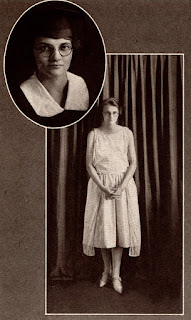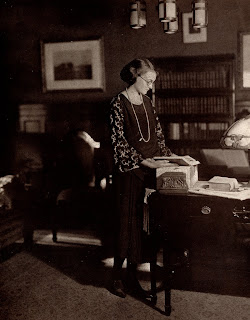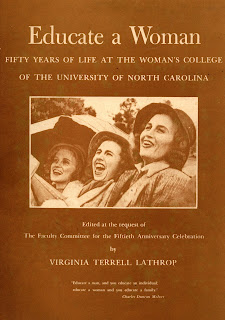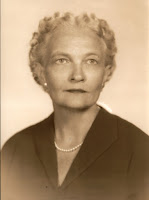The 1920s was an age marked by dramatic social changes, rejecting traditions, huge economic growth, and, for many, an exhuberant lifestyle of drinking and dancing. Though many of the women of the 1923 graduating class of North Carolina College for Women (NCCW, and now UNC Greensboro) adopted the bobbed hairstyle of the day, for the most part, they were starting the decade by focusing on getting an education rather than embracing the habits of the flapper generation. Within months of their graduation, in August of 1923, President Warren Harding died suddenly, and Vice President Calvin Coolidge was catapulted to the oval office. A year later, he would run for president and win. The class of 1923, aged at least 21 years, were of legal voting age at the time, and the ratification of the 19th Amendment in 1920 meant that they were eligible to vote in their first national election. They would begin life after graduation in a world full of new opportunities for women.
Virginia Terrell Lathrop (1902-1974) was the 1923 class president, majored in History and English, and was awarded the superlative for wisdom in her senior yearbook. It was only natural that she continued to be a clever trailblazer in the years following graduation.
Lathrop was a product of her education and chose to focus her career in journalism. A trendsetter, she became a reporter and feature writer for Raleigh’s News and Observer, Greensboro’s Daily News, New York’s Evening Post, London’s Express, the Paris edition of the New York Herald-Tribune, and Asheville’s Citizen. In later years when asked if she used her college major in her career, she wrote, “Yes – in a better understanding of people and events; and in the skills of communication through writing and talking and reading.” Indeed, her numerous articles and two books conveyed her keen interest in and understanding of the world around her.
In a 1935 questionnaire sent to members of the class of 1923 prior to their reunion, Lathrop was asked to summarize her professional and personal life during the twelve years since graduation. Aside from the newspaper work described previously, she wrote, “Roving about as secretary to a playwright in Switzerland; handling mail in a tourist agency in Paris; press agent for a professional stock company in Asheville; free lancing, with a few accepted magazine articles; marriage & housekeeping; and since then free lancing, with occasional publicity work for stock companies, theatres, Chamber of Commerce, and last year for the celebration of first English settlement on Roanoke Island.”
In just over a decade since her college graduation, Lathrop had managed to live abroad for a stint, work as a journalist for several highly respected publications in the US and abroad, as well as find time to meet and marry her husband in 1928. Albert Lathrop was educated at the Case School of Applied Science in Cleveland, Ohio and resided in Asheville at the time of their marriage. A few years later, the Lathrops welcomed their only child, a son, Terrell “Terry” Lathrop. Terry Lathrop would continue in his parents’ footsteps by attending college and obtaining a B.S. in Civil Engineering from North Carolina State College (now North Carolina State University) and an M.A. in City Planning from Yale University.
Just prior to WWII, in 1938, Virginia Lathrop returned to her alma mater to serve on staff to begin the University News Bureau. By that time, she was an experienced journalist and had remained committed to the college as well as to freedom of education for all. She also was very active in her community by serving on boards or committees of the Red Cross, YWCA, Friends of the Library, Parent Teacher Association, and the Cub Scouts. During the war, Lathrop served in a civilian capacity as a regional director for the North Carolina War Finance Committee, a role in which she organized war bond sales for western North Carolina counties. War bonds were sold to finance the war and were advertised as a way for average citizens to protect liberty and democracy; no doubt this work was an extension of Lathrop’s commitment to protecting freedom of education. In addition, Lathrop’s first book, Educate a Woman: Fifty Years of Life at the Woman’s College of the University of North Carolina, was published in 1942.
After the war, Lathrop continued to invest her time and effort in the interest of education as a member of the Board of Trustees of the Consolidated University of North Carolina. She became a member of its Executive Committee in 1953. In 1972, the organization became UNC Board of Governors and Lathrop continued to serve until her death in 1974. She also remained faithful to UNC Greensboro and visited the university many times during her tenure as a trustee and for reunions of the class of 1923.
Lathrop was known as the unofficial university historian. Her second book about the university, Bricks and People: A Walking Guide to the University of North Carolina at Greensboro, was published in 1973. She even was invited to present a brief history of the university as the 1966 Commencement speaker, in which she extolled the virtues of the founder of the State Normal and Industrial College (later NCCW and now UNC Greensboro), Dr. Charles D. McIver.
Like Virginia Terrell Lathrop, McIver was an unflagging supporter of the education of women. Lathrop quoted McIver who expressed his purpose of creating the institution as follows, “…to give such education as will add to the efficiency of woman’s work in whatever walk of life her lot may be cast.” Lathrop’s lot was cast into a walk of life characterized by service to a cause – freedom of education for all people – a movement she served her whole life.
By Suzanne Helms



